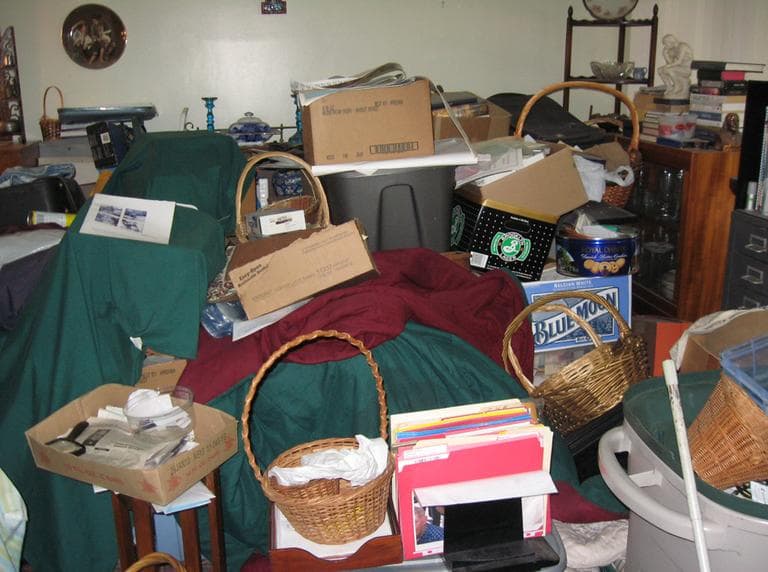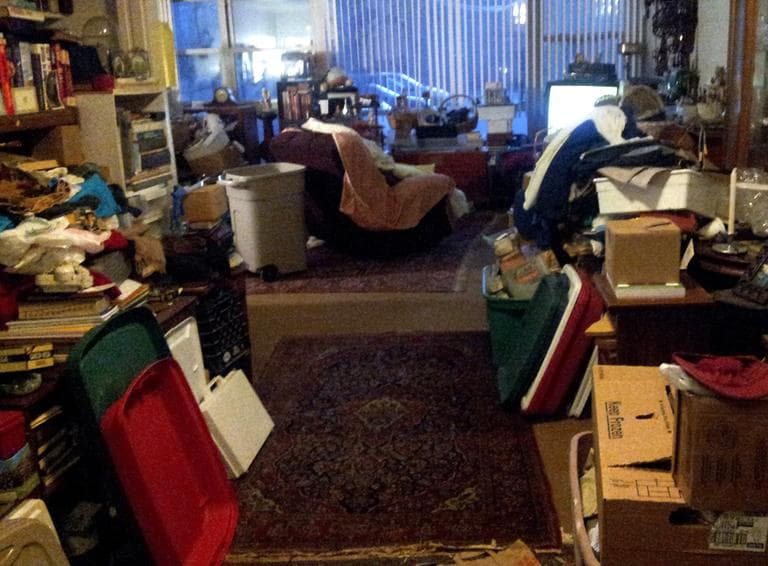Advertisement
How One Hoarder Reluctantly Parts With Some Possessions
Starting next year, psychiatrists will no longer classify hoarding as simply a type of obsessive-compulsive disorder. Instead, it will become its own separate psychiatric diagnosis.
The change is a sign that compulsive hoarding is being taken more seriously — seriously enough, in fact, that "hoarding task forces" are springing up all over the country. Massachusetts has at least 25 of them, including in Shrewsbury.
At a recent task force meeting there, a representative from the local ambulance service, Michael Hunter, says his crews have responded to emergencies at homes so filled with stuff that it was hard to get the sick or injured people out.
"I've been on calls where firefighters have used shovels to shovel out a pathway of newspapers and trash bags so that we could actually access out of a building," he says.
Also on Shrewsbury's hoarding task force are Police Officer Patricia Babin and Fire Capt. Bill Cummings. They had a case where a woman's hoarding problem was so bad she didn't realize her husband had died.
"She said, 'I haven't seen him. I can't find him,' " Babin recalls. "And we actually had to go help locate him."
Adds Cummings: "He was lost in the clutter."
Hoarding isn't only a mental health concern; it's a safety issue. It can be a fire risk, attract insects and rodents, cause illnesses from dust buildup, and lead to a floor collapse. So this new way to help hoarders involves bringing together people from multiple agencies, including police and emergency responders, since they're often the first to discover the problem.
Man Faces Eviction Due To Hoarding — Or 'Collecting'

We wanted to meet someone who's being helped by this team approach, so we visited a 74-year-old man in Cambridge who's facing eviction because of his hoarding.
Bob asked that we not use his last name because he's so embarrassed about his problem. You can barely see the floor of his two-room apartment, and every surface is covered with something — clothes, books, files, boxes, boxes on top of boxes.
"For some reason, I accumulate things," he says. "I don't like the word hoarder. I think it's insulting."
He prefers a different term. "See, I'm a great collector," Bob says. "That's the word: collector. Collector." He collects dish racks, frying pans, old reading glasses.
"See, I have all these," he says, pointing to old cassettes. "It's all good tape. I don't want to throw them away because eventually I can use these."
Advertisement
The same rationale applies to saving his bank statements from the 1980s.
"Because you never know," he says. "They might come back and say I didn't pay something," even though the statements are now 30 years old.
You might think the solution to hoarding is easy: just throw everything out. A well-meaning friend of Bob's came over once and did a wholesale cleaning. But that left Bob feeling frantic. He was terrified that something valuable may have wound up in the trash.

"My best friend, he went in, 'All right, gotta get rid of this, gotta get rid of this, gotta get rid of this.' Well, he had me going crazy!" Bob recalls.
People who study hoarding disorders say clean-outs are the wrong approach if the hoarder has no say in what stays and what goes because usually the hoarding starts all over again.
So Jesse Edsell-Vetter, who coordinates the Hoarding and Sanitation Initiative at the Metropolitan Boston Housing Partnership, is working with Bob to help him get rid of about half of his apartment's contents. Step one is sorting.
'Need' Vs. 'Want'
"These are some of Bob's rules about sorting," Edsell-Vetter says, referring to a piece of yellow notebook paper taped to the wall of Bob's apartment. It has two lists, one labeled "most important" and the other "least important."
"So when he's sorting, he comes back to this list and focuses on: Do I need this? Or, do I want it?"
Listed as "most important" is "furniture," then "photos" and then "enough clothing."
I ask Bob if "furniture" means he wants to make sure his furniture is cleared of everything now piled on top of it.
"Yeah," he replies. "What my goal is — see these two desks? That's what I want. All my stuff will be in those two desks."
Under "least important" are "books" and "old bills." They first tackle of box of church bulletins Bob has been savings for years. Edsell-Vetter asks him if they're a "need" or a "want." Bob tells him they're a need because he needs to give them to some people at his church.
"How did we define need?" Edsell-Vetter asks.
"A need is — it's good, it's a good use for them," Bob says.
A "need," Edsell-Vetter reminds Bob, is something necessary to keep you clothed, housed or fed — so it's not church bulletins.
"So that's a want," Edsell-Vetter says.
"It's a want," Bob agrees.
"This is part of the learning process," Edsell-Vetter says. "It takes some change."
Until this point in the visit, Bob has been cheerful and cooperative. But when he's pushed to clear out his bulletins, he starts breathing heavily, his face reddens, and he suddenly storms away and disappears into his kitchen.
"I need to give this to the church! I just have to give it to the church!" Bob calls from the other room.
"Can we come back and talk about it?" Edsell-Vetter says. "We usually talk through this, remember? I know it's tough. I know it's tough. Do you want to sit down?"
"Those are church bulletins. I'm trying to get them all together at once," Bob says.
"Why don't we take a deep breath," Edsell-Vetter says, "and take a break from the sorting?"
A Team Approach And A Slow Process
Edsell-Vetter says he's not surprised by this reaction because people who hoard have great difficulty parting with their possessions.
"I have watched all kinds of heart-breaking incidents over time," he says. "I've had clients who have threatened self-harm. I've watched a mother say, 'I want to give up custody of my kids and give up my housing and I will keep my stuff.' "
He believes one agency or one person alone can't solve a hoarding problem.
"In Bob's case," Edsell-Vetter says, "he's going to be working with a mental health provider, we're going to be bringing in elder services, we're partnering with his housing provider and a social worker. He needs people that can follow him over time."
And even though this team approach can be expensive, he says it's a lot cheaper than an eviction, which often involves extensive legal fees as well as the cost of a clean-out, which can run more than $10,000. But the threat of losing housing is an effective tool.
"We have the big stick of 'You could be evicted' or 'You could have your home condemned,' " Edsell-Vetter says. "That kind of leverage, I think, is more motivating for people and it allows us to push a little bit harder."
And people like Bob realize they need to be pushed. Just a minute or two after he's upset at the idea of throwing away his old church bulletins, he's fine again and even praises Edsell-Vetter for his approach.
"His method is good," Bob says. "He's helping me."
I ask Bob how it feels to have less clutter and more space.
"Oh, it feels wonderful!" Bob replies. "And one of these days you're invited back when I get it all [decluttered] and we'll have a nice cocktail."
But getting to that celebration will be a slow process. During our sorting session, Bob agrees to get rid of just a few pieces of paper. That's all he could cope with discarding, at least for the afternoon.
This program aired on December 6, 2012.

